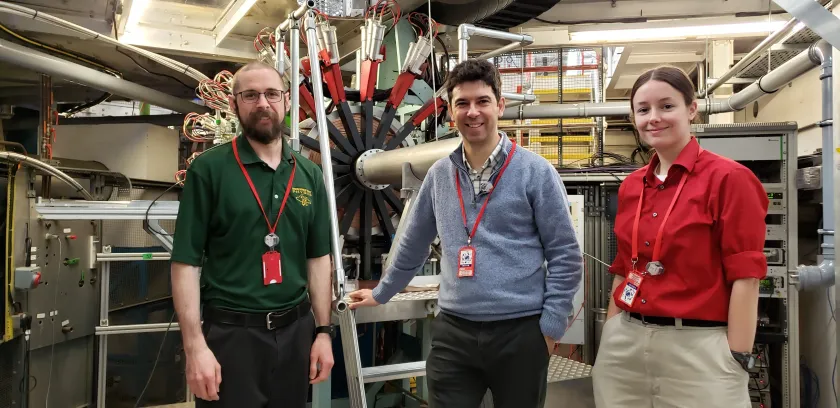Mariah Goeks entered Northern Michigan University as a Freshman Fellow, immersing herself in research typically reserved for juniors and seniors at other colleges. Her research alongside physics faculty mentor Rick (P.W.) Mengyan has included several trips to Rutherford Appleton Laboratory in the United Kingdom as part of their work with their small international collaboration, which has resulted in two journal articles Goeks has co-authored so far. Recently, the laboratory featured one of their projects as a “science highlight” in its annual review.
“Only a few of the thousands of ongoing projects are showcased in the review," said Mengyan, who is also an NMU alumnus. "It's a way to recognize work that has stood out to the community for a variety of reasons. For example, the projects might provide significant benefits to society, represent cutting-edge work or demonstrate something particularly innovative in the field. In our case, we are developing a new technique to study materials that are used in everyday technology.”
“It's very exciting that our technique is being publicized so others can see what's being developed, and they might realize it would be good to apply to the systems they're studying,” said Goeks, now a senior, who hails from Lake Forest, Ill.
Their technique uses photoexcited muon spin spectroscopy (photo-MuSR) to give a more precise picture of the kinetics of excess charge carriers—electrons and holes—in semiconductors. This is crucial when determining the performance of electronic devices such as solar cells or computer chips.
“It was intimidating at first jumping right into this work, but it's very interesting research and Dr. Mengyan is a wonderful mentor,” Goeks said. “He has been very supportive and has no problem going back and breaking something down. I have learned a lot while working with him. He introduced MuSR with a qualitative approach that has helped me form a solid understanding of what physically is happening, and that has been very useful to me as both a researcher and a student.”
On her first visit to the UK lab, Goeks said she enjoyed the hands-on opportunity to mount samples into the instrument and help set up the instrumentation for the experiment.
“Not all collaborations are as conscientious about getting students actively involved right from the get-go as ours,” she said. “Our collaboration does not have a hierarchical structure and everyone is very friendly, so I can approach anyone if I have a question. It is a really great environment to learn and gain experience in.”
Because of the COVID-19 pandemic, a September experiment had to be conducted remotely rather than at the Rutherford Appleton Laboratory. Goeks said that instead of being immersed in the experiment at the lab, it felt a little strange to only be analyzing the data as the experiment ran.
Analysis consisting of fitting data to functions that reflect what researchers think may be physically happening in the system is an important piece of running an experiment, because it can guide what features in the data researchers focus on.
Goeks will earn her bachelor's degree in May 2021. She plans to pursue a graduate degree in experimental physics.
“My Freshman Fellow experience and the three years after that helped me both to develop better research skills and become more knowledgeable about the field I plan to pursue. Graduate schools today look for students with research experience, so it's also helpful there.”

